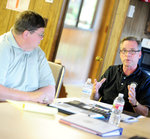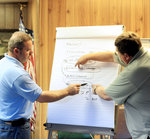



Nearly 100 previously non-union workers at Bradken’s Chehalis Foundry have voted to join the International Association of Machinists & Aerospace Workers, a shift from a nationwide decades-long drop in private sector unionization.
The employee organization at Bradken, which manufactures steel castings, marks the first time in more than 30 years a shop this large has unionized in Lewis County, according to Bob Guenther, president of the Thurston-Lewis-Mason Labor Council.
“Now they’ll have a voice in the workplace,” said Chip Elliott, a spokesman for IAM.
The workers will spend the next few weeks setting up meetings to elect a contract bargaining committee and choose job stewards to handle grievances and issues with management.
Once the group is organized, the workers will sit down with management to negotiate a contract. Members will then vote on whether or not to ratify the deal. The contract will ask for better pay, health care and pensions for workers, Elliot said, but there are many challenges to getting decent wages and benefits in an newly unionized environment.
“Quite often, you run into unhappy managment at first,” said Elliot, who lives in the Doty area. “Hopefully, we’ll get through the process and move forward.”
Allison Adam, a spokeswoman for Bradken in Tacoma, said the company will proceed with good-faith bargaining.
“We still believe it is best to communicate directly rather than through a third party,” she said. “But we respect their right to vote.”
Adam said Bradken will continue to focus on serving the customers.
“We as a company are going to remain unchanged,” she said.
Several Bradken employees approached the union in April because, they said, the Chehalis workers were earning between $4 and $7 an hour less than their counterparts at the Tacoma facility.
Adam said while the work is the same, the products being made at the two facilities are not. She cited different labor markets for the discrepancy in wages.
“They were unhappy with things that were going on,” said Will Lukens, a labor organizer for IAM. “. ...Respect and dignity was a huge issue for these folks. They felt that they were being treated like second-class citizens.”
Employees of Bradken in Chehalis echoed these same sentiments but were reluctant to go on record Monday for fear that the company would target them before the union contract is in place.
IAM representatives visited the homes of the workers over the last few months to learn about the issues in their workplace and explain union benefits. Those interested were asked to sign a petition. Once 65 percent of the workers supported unionizing, IAM filed the petition with the National Labor Relations Board on July 20.
IAM union representatives then revisited workers before they voted on whether or not to unionize on Aug. 16.
Elliott said the company hired a “union-busting” attorney to try to talk workers out of unionizing, a process which usually does turn a few supporters away.
“It’s kind of chaos during this period because employees bicker,” he said.
“Now we need to all pull together to get the best contract we can.”
The company, Lukens said, also held meetings to try to persuade workers not to vote in the union.
“They put up somewhat of an anti-union campaign,” Lukens said, “but it wasn’t fierce.”
The anti-union movement, Lukens said, is going on all over the country, especially in places like Wisconsin, where labor activists were defeated in their efforts to recall Republican Gov. Scott Walker in June.
“So this is a significant victory for this area,” he said. “Unions are about fairness, respect and dignity. It’s a voice in the workplace. ... We’re the last line of defense between the middle class and the rich.”
James Gregory, a professor of labor history at the University of Washington, said he thought the news of Bradken’s employees unionizing was noteworthy because it has been hard for unions to organize lately.
Gregory said strong unions result in better wages and a higher standard of living for both union and nonunion workers in the region.
“The shrinking of unions has translated pretty quickly to the shrinking of the middle class,” Gregory said. “Since the ‘70s the median family income has been flat and fell in the recession, while the wealthy incomes grew.”
At the height of unionization in the United States, the period from 1947 to 1972, one third of all private sector workers were unionized, according to Jake Rosenfeld, an associate professor of sociology at the University of Washington.
Today just five to seven percent of private sector employees have union representation.
“Inequality has exploded since the mid 1970s and it continues,” Rosenfeld said
Bob Guenther, an Onalaska resident and president of the Thurston-Lewis-Mason Labor Council, said the middle class in America is shrinking along with the organized labor movement, so he was glad to hear that Bradken’s employees joined IAM.
“I think it’s an opportunity for organized labor to be represented and bring our wage above 70 percent of the state’s average wage,” he said.
The average income in Lewis County for 2011 was $38,325, compared to the state’s average of $55,500. While the average Bradken employee in Chehalis made $26.54 an hour or about $55,203 in 2011, according to the company’s records.
Labor unions, Guenther said, support the middle class by negotiating better hours, wages and conditions for workers.
“Labor is not in the business to break businesses. It’s about a fair piece of the profits for the workers,” Guenther said. “Workers are your middle class and most of them will spend their money if they have it, which in turn builds stronger communities.”
•••
Amy Nile: (360) 807-8235